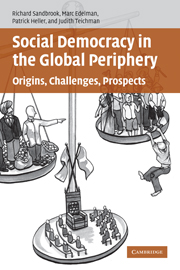Book contents
- Frontmatter
- Contents
- List of tables
- Acknowledgments
- Part I Introduction
- Part II Case studies
- 3 Kerala: Deepening a radical social democracy
- 4 Costa Rica: resilience of a classic social democracy
- 5 Mauritius: evolution of a classic social democracy
- 6 Chile: the tumultuous path to the Third Way
- Part III Patterns and prospects
- References
- Index
4 - Costa Rica: resilience of a classic social democracy
Published online by Cambridge University Press: 22 September 2009
- Frontmatter
- Contents
- List of tables
- Acknowledgments
- Part I Introduction
- Part II Case studies
- 3 Kerala: Deepening a radical social democracy
- 4 Costa Rica: resilience of a classic social democracy
- 5 Mauritius: evolution of a classic social democracy
- 6 Chile: the tumultuous path to the Third Way
- Part III Patterns and prospects
- References
- Index
Summary
“Costa Rica is not a country. It is a pilot project. It is an experiment.” Thus declared José (“Pepe”) Figueres in 1982 in the midst of the country's worst economic crisis since the depression of the 1930s (quoted in Cardozo Rodas 1990, 24). Figueres – former Junta Chief, President of the Republic, and founder of the social-democratic PLN (Partido de Liberación Nacional) – was revered by many for his role as the main architect of the Costa Rican welfare state and reviled by others for repressing left-wing labor unions in the aftermath of the 1948 civil war, as well as for later episodes of corruption and friendships with shady characters (such as fugitive financier Robert Vesco). While the claim that “Costa Rica is not a country” would strike most of its citizens as dubious (or as one of don Pepe's characteristic, forgivable exaggerations), the idea that it is – or at least was – a “pilot project” or an exceptional experiment is widely shared, at home and abroad.
Costa Rica's progress in human development and the solidity of its democratic institutions are noteworthy given that other Central American countries have markedly lower levels of well-being and long histories of civil strife and authoritarian rule. The United Nations Development Programme (UNDP) now includes Costa Rica (which ranked forty-seventh worldwide) among those countries with “high human development” (UNDP 2005, 219); in 2001, UNDP recognized that, “Costa Rica and [South] Korea have both made impressive human development gains, reflected in HDIs [Human Development Indexes] of more than 0.800 [on a scale of 0 to 1.0], but Costa Rica has achieved this human outcome with only half the income of Korea” (UNDP 2001, 13).
- Type
- Chapter
- Information
- Social Democracy in the Global PeripheryOrigins, Challenges, Prospects, pp. 93 - 122Publisher: Cambridge University PressPrint publication year: 2007
- 2
- Cited by



